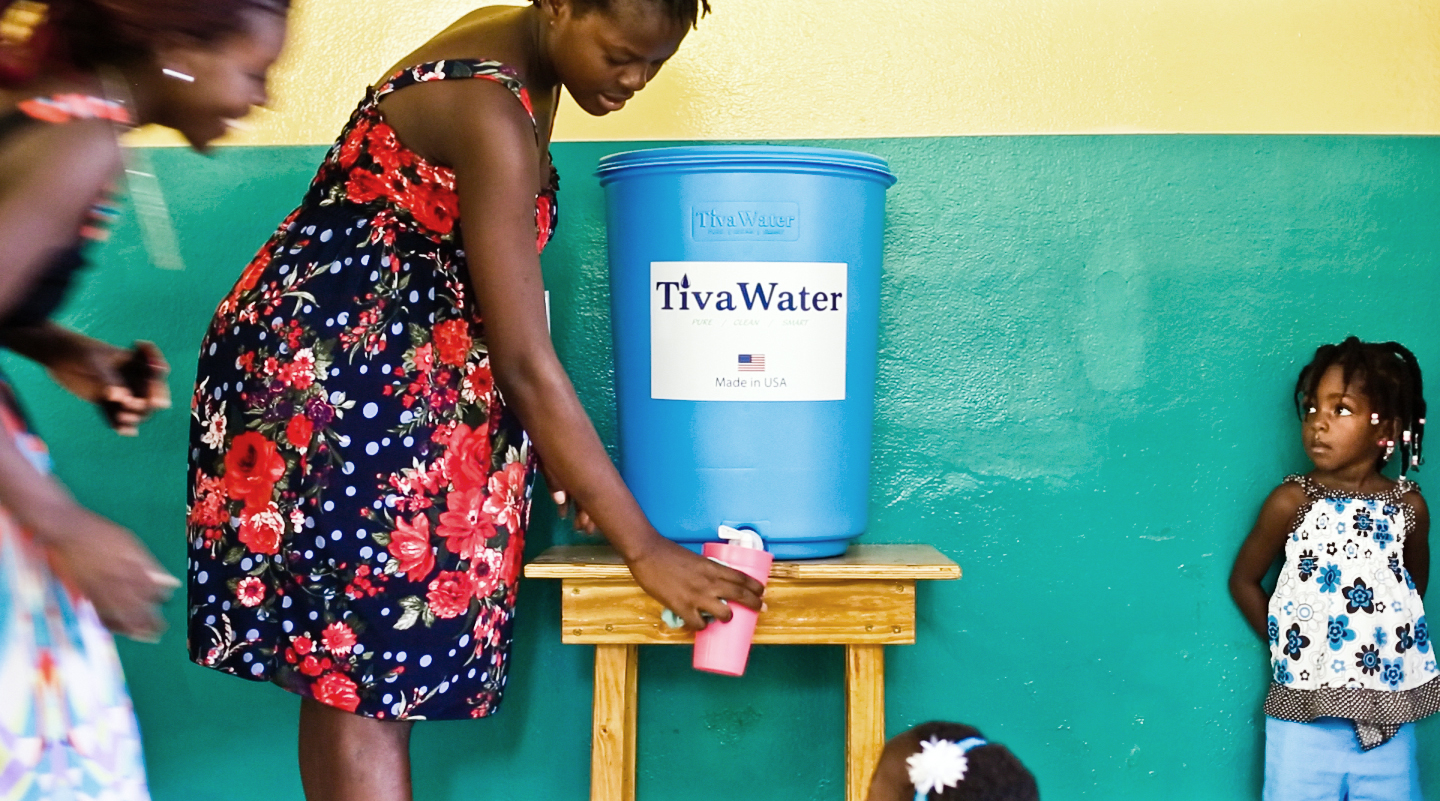A small group of UT alumni is making a big dent in the global clean water crisis.
About 100,000 people in developing nations worldwide—and counting—are accessing purified water right in their homes, thanks to the invention of a filter that cleans water at the point it is used.
The global initiative is the work of TivaWater International, a Knoxville-based nonprofit co-founded by businessmen Doug Harris (’82) and David Ragland (’83).
The filter—currently in use in Uganda, Kenya, South Sudan, Ghana, Guatemala, and Haiti—eliminates the need to boil water by burning charcoal or another form of fuel. It is equipped with a sealed outer container that holds up to five gallons of clean water at a time and keeps it from contamination.

Doug Harris, at right, sets up a TivaWater station in Uganda.
The filter can lead to cost savings for a family because they spend less on a fuel source for boiling and on medical bills as a result of improved health, says Matt King (’07), TivaWater director of international operations.
“Better health also allows the mother or father to be more productive at work,” King says. “These factors help the family pull themselves up.”
The idea for TivaWater was born after Harris and a group of other Knoxville businessmen traveled to Uganda in 2008 to find opportunities to empower communities through economic development. They were struck by the need for clean water but unhappy about the available solutions. They found that many organizations already provided access to water through drilling wells, catching rainwater, or other water-harvesting technologies. But the water would become contaminated because it was often collected in dirty buckets or left out in the home uncovered.
TivaWater developed the filter to address those issues. Harris and Ragland reached out to Neal Caldwell (’54), a physics graduate and lifelong design engineer who owns the local manufacturing company where the filters are now produced. Caldwell examined concrete and plastic filters already on the market that produced 85 to 95 percent water purity and then created a marketable plastic model that produces 99 percent water purity at the outset.
The filter can provide five gallons of clean water every twelve hours. However, unlike other models, a user does not need to wait for all the water to filter because the TivaWater filter has a sterile holding container that provides on-demand access to already purified water.
TivaWater tested the filter’s efficacy at Caldwell’s manufacturing facility in West Knoxville. It also confirmed the results through UT. Sam Blount (’13) tested the filter as part of a yearlong independent study project in the UT Center for Environmental Biotechnology. He examined how much E. coli, copper, and dyes were left in water after being put through the TivaWater filter.
“One of the biggest concerns in the developing world is the removal of pathogenic bacteria from water that can cause disease in humans,” says Alice Layton, a research associate professor and Blount’s project supervisor. “The filter removed almost 99 percent of the bacteria, the dyes, and large amounts of the copper. It’s pretty effective.”
[callout]
TivaWater introduced the first filters to Uganda in 2011. Each filter typically serves seven to ten people in a home and can be used effectively for up to five years. It also is being used in churches, clinics, and schools. To date, the organization has distributed about 10,000 filters worldwide.
[/callout]
“When we started TivaWater, we had no idea it would grow to be what it is,” says Harris, who owns twenty-three Papa John’s Pizza franchises in the South, in addition to serving as TivaWater president. “This is probably the best filter product in the world now. There’s a chance that we could really expand to potentially hundreds of millions of people.”
TivaWater has partnered with nongovernmental organizations, including Child Fund and World Vision, which are committed to water and sanitation projects. The partner organizations then donate the filters to community members in need. TivaWater also sells the filters at an inexpensive price to consumers who can afford it.
Caldwell is developing a second-generation filter that can clean up to fifty gallons of water at a time. He envisions it being used in prisons in the developing world where one cell can have up to 150 inmates drinking polluted water. Each filter would provide water for fifty inmates. He has a prototype completed and anticipates having the finished product ready to be delivered through prison fellowship ministries within the next four months.
TivaWater desires to engage young people in its mission and has been actively recruiting them. The organization took thirty students—a third of them from UT—to Uganda last summer to help distribute the filters and get a first-hand look at the organization’s work.

TivaWater station in Haiti
Students are already buying into the organization’s vision. TivaWater’s work inspired UT junior Harrison Collins to design and sell high-end bowties called TivaTies to raise money for the organization.
“Most college students know about the need for clean water around the world,” says co-founder Harris. “The story really resonates with them.”
To learn more, visit tivawater.com.

